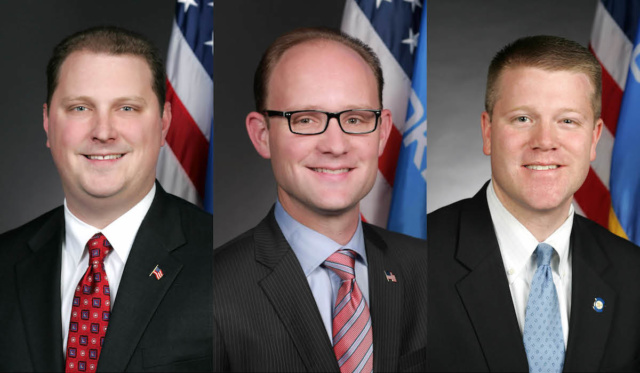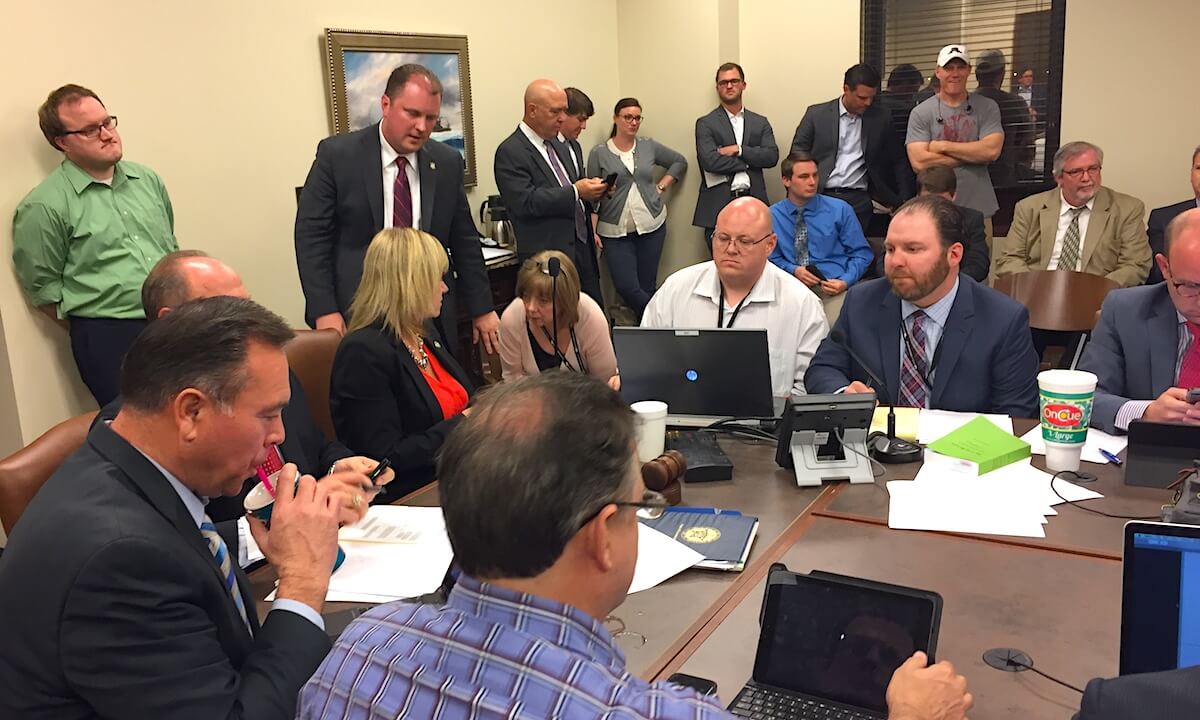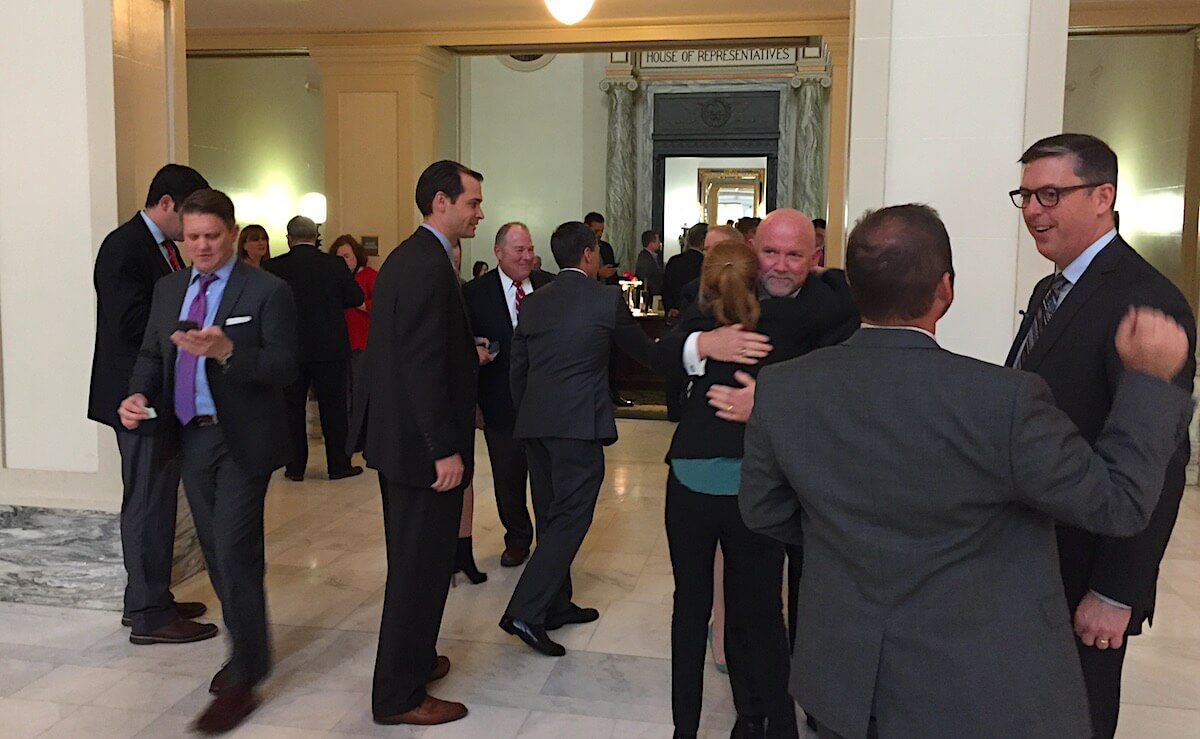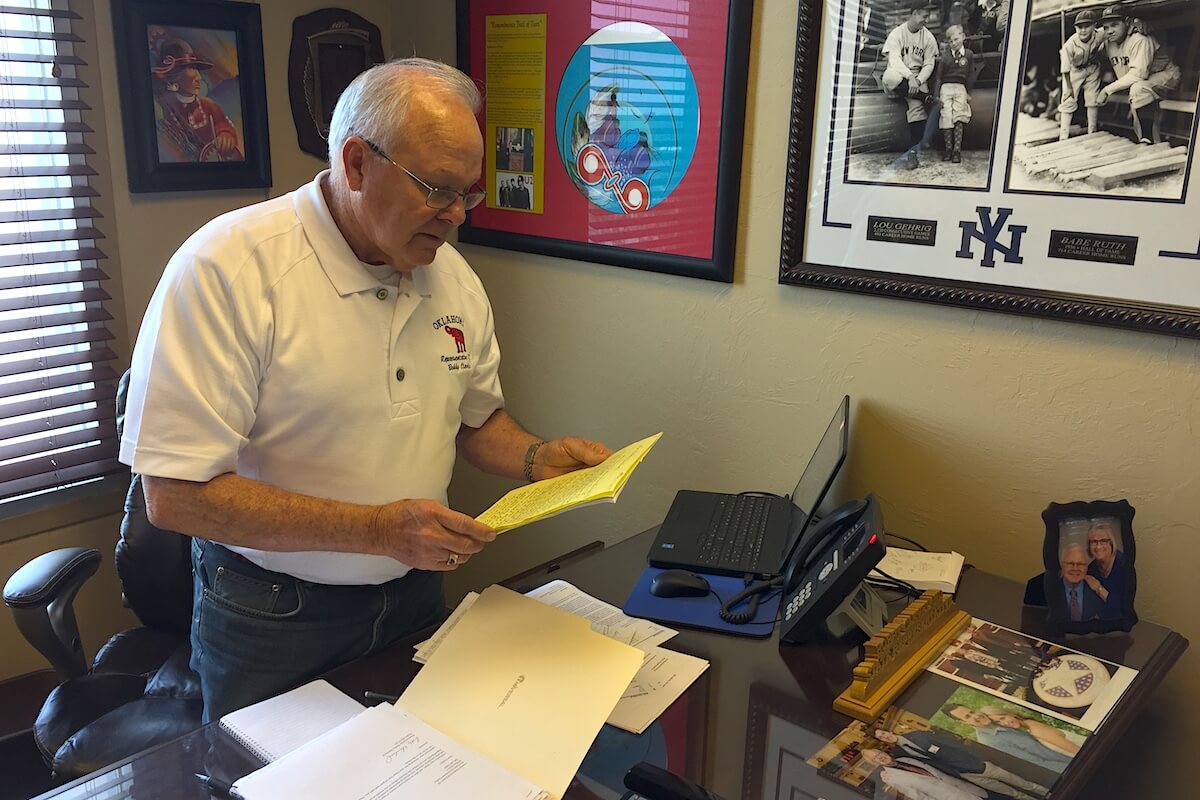

At the close of Oklahoma’s 2017 legislative session, lawmakers fully expected at least one key piece of their budget to be challenged before the state Supreme Court.
Sure enough, such a lawsuit was filed against the Smoking Cessation and Prevention Act of 2017, with tobacco companies challenging it as a “revenue” measure that constitutionally should have originated in the House of Representatives and passed with 75 percent support.
If the measure is struck down, lawmakers might have to return for a special session aimed at achieving what they did not achieve between February and May: a bipartisan revenue agreement.
Exactly why such an agreement was not reached in 2017 depends on who you ask and which way they think you should write the sentence: Either GOP leadership protected oil and gas tax breaks to the detriment of bringing key Democratic votes to the table, or House Democrats “overplayed” their hand and missed an opportunity to display their leader as a bipartisan negotiator who gets results for the people of Oklahoma.
Sanders: ‘We moved down the road’
House Majority Leader Mike Sanders (R-Kingfisher) said 2018 gubernatorial candidate and House Minority Leader Scott Inman (D-Del City) frustrated Republicans by changing his message on what numbers he would accept on gross production taxes.
More #OKLEG coverage
GOP pivots, moves budget needing only 51 House votes by William W. Savage III
“The issue I saw was that you cannot continue to move the goal line at halftime. I think that’s where the breakdown happened,” Sanders said. “Therefore, that forced our hand in many ways to be creative. Hence, the budget deal became the budget deal that happened at the end of session, and we moved down the road and didn’t have to use the Democrats to get the job done.”
Inman, on the other hand, blamed Republicans for not bringing him to the negotiating table earlier even though everyone knew “at least a handful” of Democratic votes would be needed to meet a 75-percent passage threshold on new taxes.
“When they accused us of moving the goalposts, we just moved them closer to them,” Inman said. “They moved the goalpost. We didn’t. We tried to accept something that they wouldn’t compromise on. What we found was they were really adamant about protecting the oil and gas industry this session. The voting public wanted the gross production tax to go back up to 7 percent. We were willing to accept 5 (percent).”
Echols: ‘We offered Leader Inman his idea’
In the end, negotiations stalled around a 4 or 4.5 percent figure when Republicans learned at least three House Democrats were out of state during the final days for passing “revenue” bills. House GOP leadership then set off in a new direction that did not require a bipartisan grand bargain. They crafted a budget that yielded mostly 4.8 percent cuts to non-core agencies, as well as the constitutional questions now before the Supreme Court.
“Toward the end of session, the clear breakdown was the Republicans did not have the votes to move to a 5 percent gross production tax, and the Democrats were unwilling to accept a doubling of the gross production tax at 4 percent,” said House Majority Floor Leader Jon Echols (R-OKC). “Without saying anything negative about Leader Inman, I can say this. Leader Inman filed a bill at the beginning of session that would have stair-stepped GPT where it would have increased based on the price of oil.
“We offered Leader Inman his idea — his bill — from the beginning of the year, and he said, ‘No.’”
Follow NonDoc:
Inman’s description of GPT negotiations differed slightly, and the Del City attorney spoke of what he considered an “offer” to raise GPT to 5 percent on new wells.
“When (Senate President Pro Tempore Mike Schulz, R-Altus) offered me 5 percent on just new wells, which meant only about $20 million next year, I took it to my caucus and — I’ll be very honest with you — I was very nervous about taking it to them because I thought they would overthrow me,” Inman said. “I thought they would be so angry that I would even consider bringing that to them because they wanted 5 percent on all existing wells to bring in about $300 million or a higher number on new wells.
“Well, after we talked about it for 45 minutes to an hour, the caucus agreed to accept it. Well, then we went back in and (the GOP) said, ‘We don’t want 5 percent on new wells, we only want 3 percent.’ What that did was solidify my caucus at that initial point. They believed the pro temp offered us 5 percent and negotiated in bad faith when he refused to stand by it after we had accepted it.”
Echols said he did not have enough GOP votes to pass an increase at 5 percent.
“I also have to recognize political realities,” Echols said. “If I didn’t have the votes to go to five, I didn’t have the votes to go to five.”
Inman: Big oil ‘got everything they wanted’
Echols, Sanders and a host of other key budget players said they believed the public was looking for a large revenue compromise that could have preserved agency funding while also offering a few modest increases in targeted areas like health care and education.
Various versions of such a grand bargain touted roughly $500 million in new, recurring revenue from a cigarette tax, a fuel tax and a doubling of the gross production tax on new oil and gas wells. Echols said restoring the refundability of the earned income tax credit was also offered to Inman.
More #OKLEG coverage
Reporter on first year covering #okleg: ‘I learned a lot’ by Will McCollum
“That deal for sure allowed a teacher pay raise,” Echols said. “I believe the public wanted bipartisanship. I said on the House floor that I was willing to raise the gross production tax.”
While Echols said he did not have enough GOP votes to raise the GPT to a full 5 percent, Inman and other Democrats said throughout session that they believed the floor leader did. But in the end, the oil industry passed its expansion of lateral drilling without having to face higher taxes on newly drilled wells.
“A select group of major players absolutely got everything they wanted out of this session, and they got it because the governor and Legislative Republican leadership gave it to them,” Inman said.
Echols said Republican leadership was willing to give Inman a victory lap that would likely be quite helpful in a Democratic gubernatorial primary: doubling the GPT and restoring the earned income tax credit’s refundability.
“I think hardcore partisanship is not helpful,” Echols said, adding that he got the sense Democrats intended to force special session by not striking a deal.
Two Capitol insiders extremely familiar with the year’s budget negotiations agreed with Echols’ assessment, and they offered their perspective on the budget negotiations on the condition of anonymity.
“There was no political motivation for Inman to be an honest broker,” said one insider who is a likely voter in the 2018 Republican primary. “The end result was that he overplayed his hand, and time will tell if the budget is a failure, but I think it was always in his interest for the Republicans to fail.”
The other insider, who is a likely voter in the 2018 Democratic primary, also critiqued Inman for not striking a deal to avoid cuts and potentially fund a teacher pay plan.
“How do you go around espousing good policy that helps the most vulnerable among us if that’s your end game?” the person asked.
The same person said the egos of Republicans and Democrats alike got in the way of a deal being done.
Watson: ‘Hopefully we’ve all learned something’
Like others, Rep. Weldon Watson (R-Tulsa) said reaching the 76-vote threshold for new revenue measures was the year’s biggest obstacle.
“I think the people would have been better served with a deal,” Watson said. “Hopefully we’ve all learned something.”
Sanders agreed.
More #OKLEG coverage
Criminal justice reform: ‘We’re making them meaner in prison’ by William W. Savage III
“I think people want the politicians to be statesmen,” he said. “They want them to work together to the best of their ability, and they want to solve issues. Put politics aside, put on your big boy pants and get to work.”
He said sending the Legislature into special session would certainly have been a political victory for Inman since Republicans control both chambers and the governor’s office.
“However, I think a victory, had he had the foresight to look down the road to change the GPT to 4 or 4.5 (percent), he missed a real opportunity, in my opinion,” Sanders said. “The victory lap could have been taken. I think he absolutely overplayed. His calculations were off, and ultimately there’s mud in his face. He took a risk and lost.”
While he may not have gotten a victory on GPT, Inman and his caucus were the leading force in even bringing the issue to the table, something that surprised lobbyists and other onlookers as session moved forward.
Although different observers felt Inman was either considering his gubernatorial campaign too much or too little in negotiations, the 11-year legislative veteran said he was trying to keep his eye on a ball that would best help the people of Oklahoma in the long run.
“Hindsight is 20/20, but when I went into that battle with the caucus trying to do the right thing on gross production taxes, I wasn’t considering my statewide campaign. I know that may sound unlikely, but legitimately I wasn’t,” Inman said. “In fact, during the battle, I received phone calls from several trusted advisers who reached out to me and said, ‘We think you may be too tough on those big oil and gas guys. You may make them too angry and they may want to come beat you in a primary or a general election when you run for governor.’
“My caucus and I chose to do what we believed was the right thing, which was to continue fighting for gross production tax to go to at least 5 percent minimum and all the way up to 7 percent ultimately because that’s what the state needs to help fund education, health care and public safety.”
Inman also said he believes standing on principle will be important heading into the 2018 legislative session.
“If it was all about political expedience and all about benefiting me in a campaign, I would have done things differently, but that wasn’t my priority,” Inman said. “And you can see, as it turned out, clearly taking the lumps we took without actually getting the success that we hoped for for the state of Oklahoma didn’t do anything to benefit me or my campaign, but hopefully it keeps the dialogue going to where we can accomplish what we need to accomplish for the citizens of this state next session.”
‘A grand bargain is a win for the state of Oklahoma’
Sanders, Echols and others, however, said they expect the 2018 session to be an even harder climate for a grand revenue bargain because many GOP lawmakers have already taken controversial revenue votes that may not play well in a Republican primary. Still, all players who commented on this topic emphasized the public’s ongoing desire for bipartisanship, even after it was not found in 2017.
“I felt like the citizens wanted bipartisanship,” Echols said. “I don’t think citizens think in terms of Republican and Democrat. Some citizens do. But I think most citizens think in terms of what is best for the state of Oklahoma, and this year was the year to do it.”
Sanders said the handful of GOP lawmakers who opposed all new revenue measures also should keep the public desire for compromise in mind.
“Do I think that maybe they’re missing a big piece of the puzzle?” Sanders asked. “I think to some degree they are. But again, that’s my opinion.”
Echols said he wished the revenue puzzle could have been solved this year.
“I think a grand bargain is a win for the state of Oklahoma, and I think anyone should have wanted to be a part of a grand bargain for Oklahoma,” he said.























